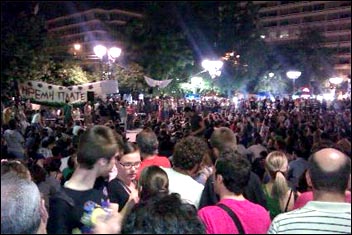Christina Ziakka, Xekinima (CWI in Greece)

Massive general strike in Greece on 15 June 2011, photo Stephan Kimmerle
In October 2011 the Greek Pasok government of George Papandreou (just before being forced out of office), announced the implementation of a new housing tax through people’s electricity bills. It will cost already hard pressed Greek workers hundreds of euros a year.
Those who did not pay the tax within 40 days would have their electricity supply cut in the middle of winter. Yet even before the new tax, according to the Electricity Company (DEI), 320,000 households could not afford to pay their electricity bills!
The only exemptions to this new tax are the unemployed in receipt of unemployment benefit (ie 183,000 out of total of about one million, officially, as unemployment benefit is only handed out for the first 12 months) and disabled people if their disability is over 80%!
Public anger forced a number of mayors and local governments to take initiatives.
The mayor of Nea Ionia in Athens, who is an independent left (supported by Syriza and other sections of the left, like Xekinima, in the last elections) called on citizens to refuse to pay the tax. He organised legal assistance and stated that the electricians who worked for the council would reconnect the electricity supply if it was cut by DEI.
Currently more than 50 municipalities nationwide have taken decisions to support those who will not pay the tax.
Initiatives
The (public sector) Electricity Company Workers Union responded with an open call to all the technicians of the company to refuse to cut the power at workers’ houses.
And for over a week, at the end of November 2011, they occupied the central office of the company responsible for billing and power cuts.
Even the Union of the Technicians of private companies stated publicly that they will not cut the power to any household, if asked to do the “dirty” job that the public electricians refused to do.
Dozens of other unions urged their members to actively support the movement against the housing tax.
Hand in hand with these developments are many initiatives of people to build the movement. In some areas we had the reactivation of the ‘local assemblies’ that initially appeared during the movement of the “Enraged” in the summer.
Though the assemblies, or the “can’t pay, won’t pay” committees that have been reactivated are small, attracting mainly left activists, a common feature is the big response of people to the open meetings called by the local assemblies etc.
There have also been a number of occupations of DEI branches, the formation of teams of volunteer electricians and collective attempts of local people to take legal action against the tax.
These developments have put a lot of pressure on the government and forced them to announce some concessions: the freezing of any electricity supply cuts for a while and the exemption from the tax of people with “proven inability to pay”.
However, these concessions are, in reality, a smokescreen. The government will go all the way – cutting the electricity supply of households and sending people to court – in order to collect the tax.
Not only because they expect to get €2.9 billion from this tax during 2012 (the ‘Troika’ ie the EU, the European Central Bank and the International Monetary Fund, demanded daily updates on the progress of the collection of the tax) but, also, because if the government fails to enforce the tax, then this will raise the confidence of the movement to overthrow the austerity policies and the government itself.
The government and the state mechanisms can succeed against individuals. But what can they do if 500,000 or one million households refuse to pay?
Xekinima is heavily involved in this campaign and argues for the need to build committees in neighbourhood and local community, to organise meetings and committees to defend every single household. The campaign must be linked to the other working class struggles and social movements, to get rid of the hated Greek government and kick out the Troika once and for all.







